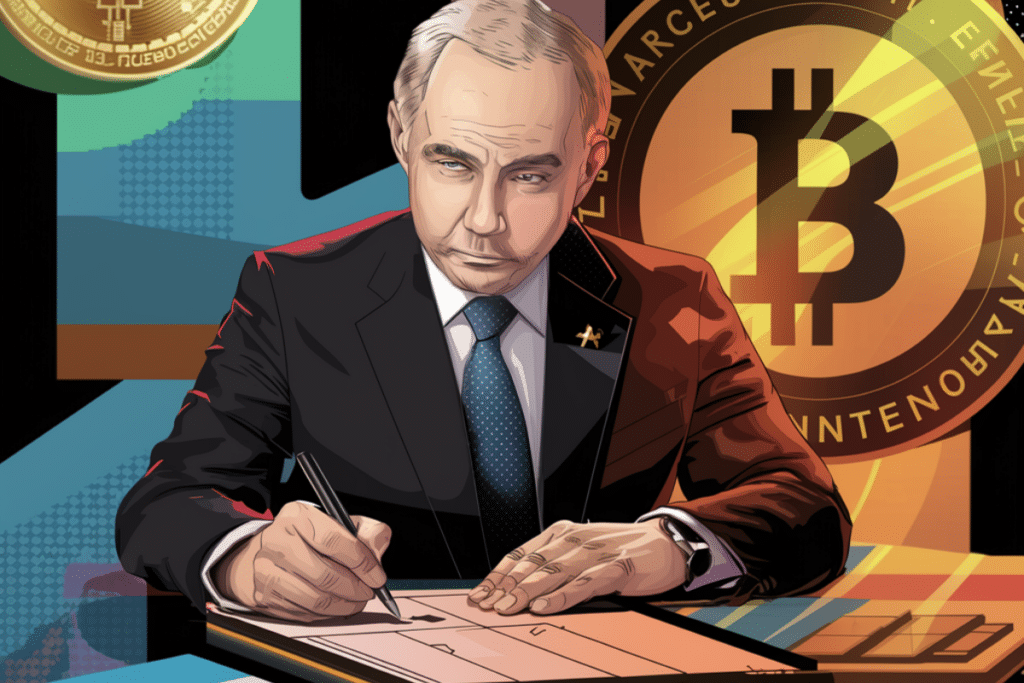Poutine signs historic law: Crypto and CBDC to serve Russian foreign trade!
Russian President Vladimir Putin signed a historic law on March 11, paving the way for the use of digital financial assets and CBDCs for international payments. This measure aims to help Russian companies circumvent Western sanctions and facilitate trade with allied countries.

The Duma swiftly adopts the bill on CBDC payments
The Russian parliament passed the bill on payments in digital assets at breakneck speed. The State Duma’s financial market committee first approved the text on February 21. The lower house then reviewed the bill in second and third readings at the end of February. Finally, the Federation Council, the upper house, swiftly ratified the text on March 6.
Anatoly Aksakov, chairman of the financial market committee, reported on February 27 that the law was becoming urgent due to the current absence of regulations governing the use of digital assets for international payments. He also emphasized that the law does not apply to cryptocurrencies, such as Bitcoin, considered illegal as currency in Russia.
According to the Russian media RBC, the law will come into effect immediately upon its official publication, with the exception of some provisions that will be implemented later. This regulatory framework opens the path for the use of digital assets as a means of payment for commercial transactions abroad.
Aksakov believes that this law will help Russian importers and exporters to work more efficiently with friendly countries and to mitigate the impact of sanctions to some extent. Several allies of Russia have also expressed strong interest in the use of digital assets and CBDCs in their trade exchanges with Moscow.
The Central Bank of Russia gains new regulatory powers
The law signed by Putin endows the Central Bank of Russia with new regulatory powers over the payment sector. As the sole issuer of the digital ruble and the main regulator of the “Digital Financial Assets (DFA)” or “Actifs Financiers Numériques” in French, the bank will now have the power to regulate transactions made using these assets.
DFA issuers will be required to provide the Central Bank with information on the recipients of the assets, while companies using DFAs and CBDCs for payments will need to record all transactions in a new dedicated information system.
Russian legislation recognizes a wide range of digital assets as DFAs, including digitized commodities and securities, digital rights, and digitized monetary claims. Investors will also be able to buy digital shares in non-public Russian companies.
Russia is not the first country to use CBDCs for international transactions. Earlier this month, China and the United Arab Emirates conducted transactions worth 13.6 million US dollars using digital yuan and digital dirham.
The adoption of this groundbreaking law marks a major turning point for Russia in its quest for financial sovereignty in the face of Western sanctions. By authorizing the use of digital assets and the digital ruble for international payments, Moscow hopes to facilitate trade with its allies and provide new options for its businesses.
However, some experts call for caution, noting that the requirement to record all accounting related to DFAs in Russian systems and the absence of provisions for foreign DFAs could pose obstacles for non-Russian trading partners.
Maximize your Cointribune experience with our "Read to Earn" program! For every article you read, earn points and access exclusive rewards. Sign up now and start earning benefits.
Passionné par le Bitcoin, j'aime explorer les méandres de la blockchain et des cryptos et je partage mes découvertes avec la communauté. Mon rêve est de vivre dans un monde où la vie privée et la liberté financière sont garanties pour tous, et je crois fermement que Bitcoin est l'outil qui peut rendre cela possible.
The views, thoughts, and opinions expressed in this article belong solely to the author, and should not be taken as investment advice. Do your own research before taking any investment decisions.